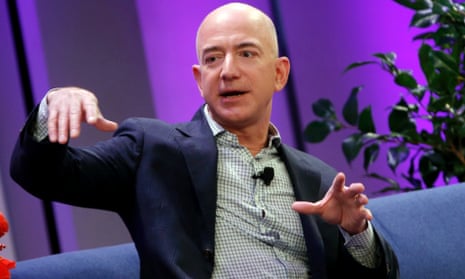All around the world, people are writing letters about themselves to a distant, all-powerful figure who can make their dreams come true. But this year, many of those letters will be addressed to Amazon boss Jeff Bezos rather than Father Christmas.
Users of Amazon’s Mechanical Turk crowdworking marketplace have launched a Christmas letter writing campaign to the company’s founder and CEO, asking him to stop selling them as cheap labour and to give them tools to represent themselves to employers and the world at large.
The campaign is the brainchild of Kristy Milland, a 35-year old Canadian who noted that Jeff Bezos occasionally responds personally to emails sent to his jeff@amazon.com email address.
Mechanical Turk launched in 2005 as a way for companies to farm out digital tasks that computers find difficult but humans breeze through, such as transcribing, writing and tagging images.
Over the last nine years, Milland has completed more than 830,000 tasks on Mechanical Turk, earning an average of 20 cents for each. “I hope our letters make Jeff Bezos realise that there are living, breathing human beings who rely on this service he provides to feed and shelter themselves and their families,” she says.
Mechanical Turk is named after a famous 18th-century chess-playing robot that turned out to conceal an elf-sized grand master. Some ‘Turkers’, as workers like to call themselves, feel that little has changed since then.
“I am a human being, not an algorithm, and yet [employers] seem to think I am there just to serve their bidding,” writes Milland in her letter to Bezos. Amazon does not set minimum rates for work, which can pay less than $2 a hour, and takes a 10% commission from every transaction. Employers can even refuse to pay for work altogether, with no legal consequences.
Just like Father Christmas, Jeff Bezos knows which Turkers have been naughty or nice. Each worker is rated by how many of their tasks have been approved or rejected. The most productive are invited to become ‘Masters’ and gain exclusive access to better-paying tasks (for which Amazon gets a bigger commission). Conversely, Amazon can deactivate Turkers’ accounts at any time, without giving a reason.
“In the last four years, I have had so many problems getting my cheques that I have considered just quitting,” writes Manish, a Turker from India. “There have been numerous cases of workers losing their accounts without any fault of their own. Workers are left with little to no support from Amazon.”
But Amazon must be doing something right. There are now over 500,000 Turkers working for Mechanical Turk in 190 countries, and some letter writers are full of praise for the service. A 26-year old Turker called Orlando from California writes, “Since beginning to work on Mechanical Turk, I’ve only made $500, but to me sir that means a lot. It means paying for three weeks of day care, it means groceries for the month, it means car and health insurance premiums.”
The letter writing campaign is hosted on a collaborative website for Turkers called We are Dynamo, set up this summer by researchers at Stanford University and UC San Diego in California. “We need different approaches to collective action in the internet age,” says assistant professor Michael Bernstein. “Anyone can pitch a 140-character idea on the site, which then needs to get sufficient votes to make it happen. This whole campaign was driven by the Turkers themselves.”
The goals of the campaign, which hopes to eventually beam hundreds of letters into Jeff Bezos’s inbox, are as varied as the Turkers themselves. Some just want to celebrate Mechanical Turk’s flexibility and bite-size tasks. Others are demanding a more modern website that allows them to market themselves to employers and, in return, rate companies as good or bad to work for.
“These are not rants,” says Bernstein. “One difference from letters to Santa is that many are not even explicitly asking for something. They all have things they’d like to change but what they really want is recognition.”
The Turkers also want to correct the impression that they are all untrained workers earning a pittance in developing countries. “The group of workers that you have are highly skilled and educated,” writes a 55-year old ex-tax accountant and small business owner from California. “Most employers would jump at the chance to have the skills that some of us possess.”
Of course, the $2 question is whether Jeff Bezos will actually reply to them. “I think that Jeff’s team will read our letters, but I’m not sure if they’ll make it to the top,” admits Kristy Milland. “But once we have more Turkers writing, he’ll have to get involved as the word spreads that we’re organising.”
“From the Turkers’ perspective, they win either way,” says Michael Bernstein. “If Bezos responds, they can say that Jeff understands their situation. But if he doesn’t respond, and yet people are paying attention to the letters, what does that say about him and about Amazon?”
If it is recognition the Turkers want, perhaps Bezos should take another leaf out of Father Christmas’s book. Any letter sent to Santa’s grotto in Reindeerland (with a stamped envelope) by this Saturday is guaranteed a cheery Christmas card by return of post.
Even without drones, Amazon Prime could probably even get it there faster than that.

Comments (…)
Sign in or create your Guardian account to join the discussion